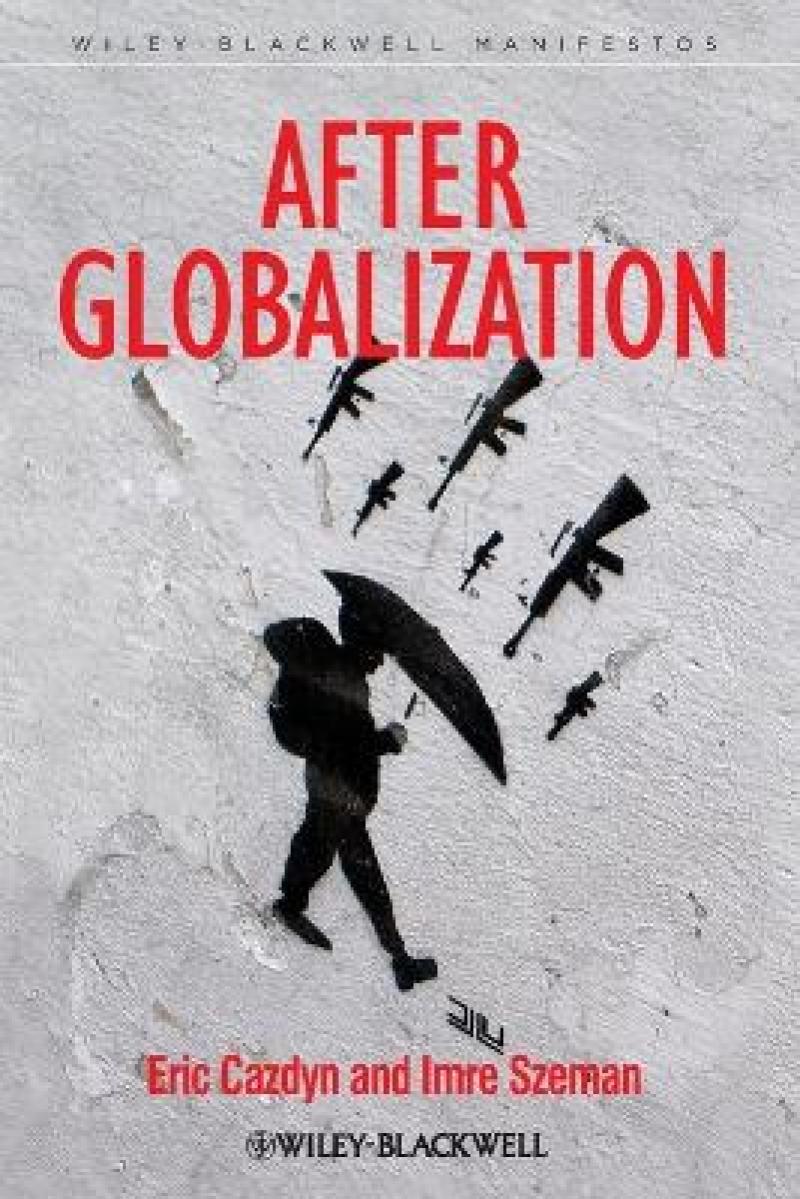<p>“Summing Up: Recommended. Upper-division undergraduates and above.” (<i>Choice</i>, 1 August 2012)</p>
“Relentlessly, remorselessly, endlessly, we are told there is no alternative to globalization, whether our lecturers are bourgeois economists, progressive journalists, or imaginative litterateurs. Eric Cazdyn and Imre Szeman dare to go beyond the standard thinking of the day and query the very heart of mobile capital and its impact on daily life. Their alternative vision breathes new life into our sense of evolution and inevitability.”
Toby Miller, author of Globalization and Sport and Global Hollywood
“Cazdyn and Szeman begin with the idea that the current economic crisis has historicized globalization, turning it from a process that looked as inevitable as, say, global warming still does, into an episode in the history of capitalism: hence the possibility not just of more globalization but of an “after globalization.” And hence also, they argue, the renewed possibility of an “after capitalism.” In powerful critiques of what they describe as the common sense of capital today they sketch out the terms in which changes more radical than substituting generous and honest leaders for the greedy and dishonest ones we’ve currently got might begin to be imagined.”
Walter Benn Michaels, University of Illinois at Chicago
In lively and unflinching prose, Eric Cazdyn and Imre Szeman argue that contemporary thought about the world is disabled by a fatal flaw: the inability to think “an after” to globalization. After establishing seven theses (on education, morality, nation, future, history, capitalism, and common sense) that challenge the false promises that sustain this time limit, After Globalization examines four popular thinkers (Richard Florida, Thomas Friedman, Paul Krugman, and Naomi Klein) and considers how their work is dulled by these promises. Cazdyn and Szeman then speak to students from around the globe who are both unconvinced and uninterested in these promises and who understand the world very differently than the way it is popularly represented.
After Globalization argues that a true capacity to think an after to globalization is the very beginning of politics today.
Acknowledgments
A Prixecis: The Argument 1
Part I: The Afterlife of Globalization
a. Nothing Can Save Us 5
b. From Globalization to Anti-Americanism 9
c. From Anti-Americanism Back to Globalization 15
d. “I face the World as it is”: On Obama 29
e. Of and After: Two Narratives of the Global 34
f. Seven Theses after Globalization 44
g. Something’s Missing 57
Part II: The Limits of Liberalism
a. After Globalization, or, Liberalism after Neoliberalism 69
b. Neoliberals Dressed in Black: Richard Florida 77
c. The Anecdotal American: Thomas Friedman 100
d. Confidence Game: Paul Krugman 114
e. The Non-Shock Doctrine: Naomi Klein 134
f. The Limits of Hollywood: Michael Clayton 152
Part III: The Global Generation
a. Next Generation 171
b. From Anti-Americanism to Globalization 173
c. A Map of the World 179
d. Biogeographies 207
e. Can’t Get There from Here 218
Conclusion: “Oh, Don’t Ask Why!” 225
Index 239
After Globalization argues that a true capacity to think an after to globalization is the very beginning of politics today.
"Relentlessly, remorselessly, endlessly, we are told there is no alternative to globalization, whether our lecturers are bourgeois economists, progressive journalists, or imaginative litterateurs. Eric Cazdyn and Imre Szeman dare to go beyond the standard thinking of the day and query the very heart of mobile capital and its impact on daily life. Their alternative vision breathes new life into our sense of evolution and inevitability." Toby Miller, author of Globalization and Sport and —Global Hollywood
"Cazdyn and Szeman begin the with the idea that the current economic crisis has historicized globalization, turning it from a process that looked as inevitable as, say, global warming still does, into an episode in the history of capitalism: hence the possibility not just of more globalization but of an 'after globalization.' And hence also, they argue, the renewed possibility of an 'after capitalism.' In powerful critiques of what they describe as the common sense of capital today they sketch out the terms in which changes more radical than substituting generous and honest leaders for the greedy and dishonest ones we've currently got might begin to be imagined." —Walter Benn Michaels, University of Illinois at Chicago
Produktdetaljer
Biografisk notat
Eric Cazdyn is Professor of Cultural and Critical Theory, Psychoanalysis, and East Asian Studies at the University of Toronto. He is author of The Already Dead: The New Time of Politics, Culture, and Illness (2012) and The Flash of Capital: Film and Geopolitics in Japan (2003), and editor of Trespasses: Selected Writings of Masao Miyoshi (2011).
Imre Szeman is Canada Research Chair in Cultural Studies at the University of Alberta. He is co-editor of Cultural Theory: An Anthology (Wiley-Blackwell 2010), author of Zones of Instability: Literature, Postcolonialism and the Nation (2003) and co-author of Popular Culture: A User?s Guide (3rd. ed. 2013).
